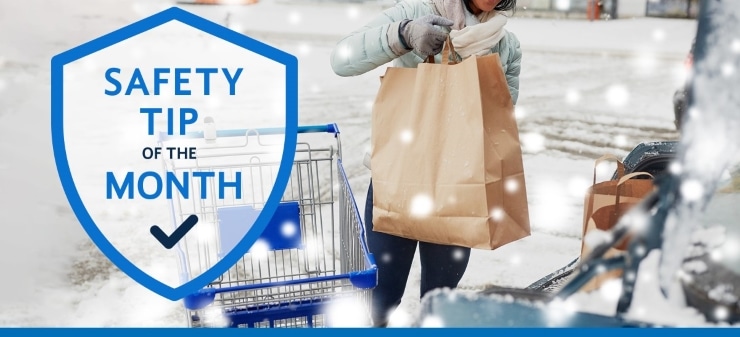Like any other business, the grocery business has its own unique safety hazards. From slips, trips, and falls to food poisoning to cuts and bruises, there are numerous ways customers and employees can be injured. When winter sets in, the risks only increase, especially during the busy holiday season.
Grocery Store Winter Safety Hazards
To reduce the risks of costly injuries and financially draining liability claims, be diligent about identifying and minimizing potential winter safety hazards in and around your store. Follow these best practices to keep your customers, your employees, and your grocery business safe during the winter season.
- Keep Ice and Snow Cleared From Your Property. Whether you do it yourself or hire a contractor, it’s crucial to keep your parking lot, sidewalks, ramps, and other outdoor passages free from snow and ice. Spread ice melting compound and/or gravel in high traffic areas. Make sure downspouts and gutters are in good working order. A water leak onto sidewalks, parking lots, or other walking surfaces can create an icy slip and fall hazard.
- Keep Entrances Clean and Dry. You don’t want a slip and fall in your entryway to be the first impression a customer gets of your store. Use durable floor mats at all entrances and keep them clean. Replace them regularly during wet weather to keep your entryway dry and safe. Keep a dry mop nearby for entryway cleanups.
- Practice Good Housekeeping. All employees should be trained in good housekeeping measures to keep the sales floor clean, dry, and free of slip, trip, and fall hazards. Monitor the entire sales floor regularly, and don’t leave items such as empty boxes, ladders, milk crates, and stepstools unattended. Immediately clean up any spills or debris, and use appropriate cones and caution signage around the hazard during cleanup. And don’t forget – your good housekeeping should extend to the back room too, keeping aisles and floors clear of debris and other safety hazards.
- Use Proper Hazard Signage. The Occupational Safety and Health Administration (OSHA) requires business owners to display appropriate hazard signs to alert customers and employees when surfaces are wet or slippery. Put out hazard cones and caution signs as soon as a hazard is identified. Make sure the signage is prominently displayed where anyone walking in the area can easily see it.
- Remind Employees to Be Winter Safe. Remind your employees to wear proper footwear and other winter gear to stay safe in winter weather conditions and reduce the chance of slips and falls.
Are You Following Grocery Store Best Practices?
Making your grocery business a safe place to work and shop in the winter is a team effort. Educate your entire staff on winter safety hazards, and consider posting the following Winter Safety Tip Sheet in your break room. Talk to the grocery insurance team at RiskPoint Advisors to ensure you have adequate protection against this costly exposure.
| Joe Scarpello | Melissa Johnson |
| 253.444.5584 | 253.444.5654 |


